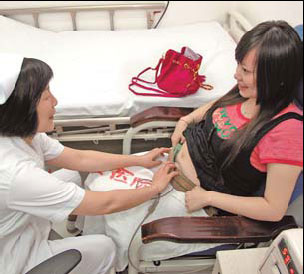Life and Leisure
Pregnancy test could save lives
(China Daily)
Updated: 2010-09-15 07:53
 |
Large Medium Small |
|
A mom-to-be takes a check-up at a Shanghai hospital. Gao Erqiang / China Daily |
It may be possible to predict which women will develop pre-eclampsia, a dangerous complication of pregnancy, weeks before they show the first symptoms, an international team of researchers reported on Monday.
They found a series of 45 different compounds linked with their metabolism that were different in women destined to develop the condition, and said that could form the basis of a test.
From this series of compounds they narrowed down a list of 14 sugars, fats and amino acids that were different in the women who developed the condition.
Such a "metabolic fingerprint" test could save the lives of thousands of women, Philip Baker of the University of Alberta in Canada, who helped lead the study, said in a statement.
"If we can bring the rates of maternal deaths in undeveloped countries down to the rates in developed countries, by being able to determine which women are at the greatest risk of developing pre-eclampsia, then it has the potential to save thousands of lives."
There is currently no test to predict which women will develop pre-eclampsia, which is marked by high blood pressure and high protein levels in urine.
If mothers and their babies survive, the women later have a higher risk of high blood pressure, heart disease, stroke and diabetes. The babies are usually born prematurely and suffer complications all their lives.
The cost of treating mothers with pre-eclampsia is $45 billion a year in the United States, Europe, Asia, Australia and New Zealand, the researchers say.
In undeveloped countries, 75,000 women die from pre-eclampsia each year.
Writing in the journal Hypertension, the researchers say they did a simple study, testing the blood of 60 women who developed pre-eclampsia later in pregnancy and 60 women who did not. They ran the test at about 15 weeks gestation.
It detected around 90 percent of the cases, with a false positive rate of about 24 percent, meaning 24 percent of the women flagged in the test as having a risk of pre-eclampsia would never actually develop it.
Eleni Tsigas, executive director of the Pre-eclampsia Foundation, said in a statement that a high caliber predictive test would allow women identified at high risk of pre-eclampsia to seek obstetric care by specialists and to be monitored more closely.
"There's no reason why women should be caught unaware in the late stages of a pre-eclampsia crisis," Tsigas says.
Reuters
